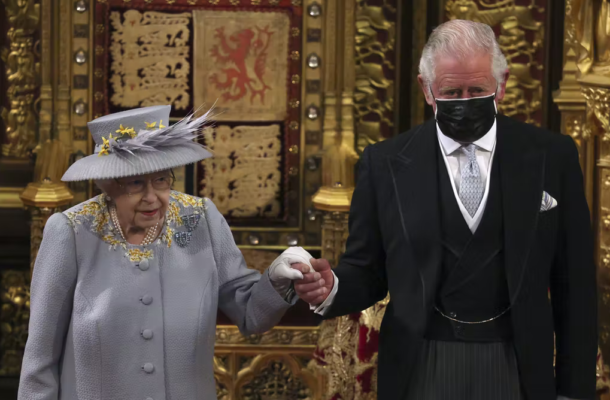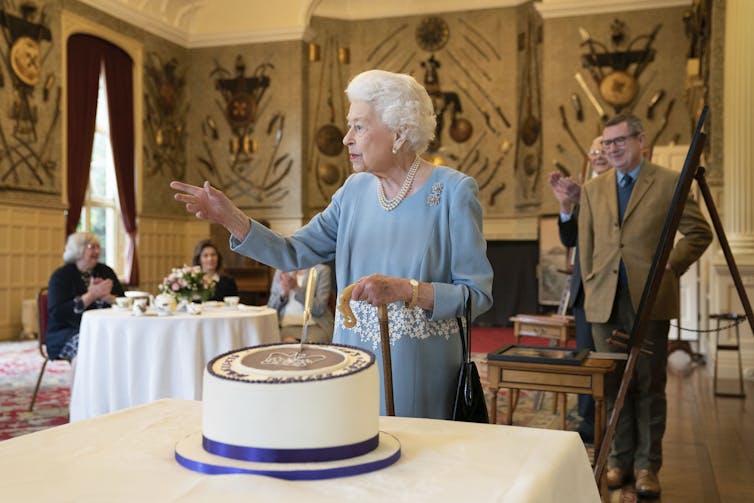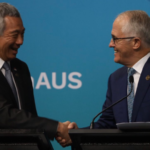Looking forward and back at the Queen’s 70th jubilee

This week’s Platinum Jubilee marks 70 years of Queen Elizabeth II’s reign over “the people of the United Kingdom, the Realms and the Commonwealth”. This occasion, the first ever for a British monarch, allows us to reflect on the importance of succession.
The queen’s royal title and duties will one day be transferred to Prince Charles, the 73-year-old Prince of Wales.
Although the timing of this transition remains uncertain, it may prompt many Commonwealth nations such as Australia to reconsider the legacy and legitimacy of the monarchy itself.

The rules of succession
Succession has long been the weak link in the system of hereditary monarchy.
Sometimes this is because the current ruler produces no surviving heirs, as in the case of Queen Anne, or Carlos II of Spain.
Alternatively, it may be because others dispute the line of succession, as was seen in the war-provoking disputes over succession in the cases of William the Conqueror and “Bonnie Prince Charlie”.
Sometimes, succession has not been successful because the new monarch has practised the “wrong” religion, or married the “wrong” sort of woman – as was thought of James VII and II and Edward VIII, respectively.
Perhaps most memorably the objection to the principle is so violently held, no succession is possible at all. This was true in the cases of Charles I of Great Britain, Louis XVI of France, and Nicholas II of Russia.
For such reasons, successions must be carefully managed if monarchs want to ensure the royal line is preserved.
Succession and legitimacy
Across the Commonwealth, the monarch plays a crucial role in legitimatising systems of government.
Historical continuity denotes stability, an attribute that monarchies are supposed to embody. Hence the idea of the “king’s two bodies”: the physical form of the monarch may perish, but the idea of monarchy continues in the body of the new king or queen.
Our current queen holds the title of Queen Elizabeth II to associate her in line of succession with Elizabeth I. However, Queen Elizabeth is not, in fact, the second Elizabeth to reign in Australia, New Zealand, Canada, or even Scotland.
Instead, this continuity of title serves to imbue the monarchy with a sense of stability independent of party, faction, nation, or ideology.

Queen Elizabeth II has come to represent the stability and longevity of the British monarchy.
This is not to say the monarchy is “above politics”, as is often claimed.
The emphasis on political stability and historical continuity puts it, as an institution, firmly in the conservative camp.
Conservatives tend not to write down their rules of operation in one place. One notable exception is Walter Bagehot’s The English Constitution. Published in 1867, this influential book distinguishes between the “efficient” and “dignified” parts of the constitution.
Bagehot viewed the “efficient” part of the constitution as responsible government, primarily concerned with statecraft, grand strategy, and the day-to-day running of kingdoms.
The “dignified” part, in contrast, provided a symbolic focus for the the notions of unity and loyalty across Britain and its Empire – of which the monarchy was a central element.
According to Bagehot, having a popular monarch is crucial to upholding the legitimacy of the political system.
Public perceptions of the monarchy
However, the popularity of a monarch can cut both ways.
If a monarch is unpopular, the legitimacy of the system can suffer. This is exemplified by public perceptions of Queen Victoria in the 1870s.
Following Prince Albert’s death in 1861, Queen Victoria remained largely absent from public life during an extended period of mourning. Meanwhile, republicanism gained significant political traction in England.
Similarly, neither Elizabeth II nor the monarchy were particularly popular in either the UK or Australia during the 1990s. Moreover, the death of Diana, Princess of Wales, in 1997 further damaged the monarchy’s public image.

The death of Diana, Princess of Wales, rocked public perceptions of the British monarchy.
Significant political resources were mobilised in the UK to rectify this situation. As a result, the monarchy was largely rehabilitated by the time of the Queen’s Golden Jubilee celebrations in 2002.
Yet, attitudes towards the monarchy can be equivocal – not least in Australia.
Former Prime Minister Tony Abbott, the most open promoter of monarchy among Australia’s recent prime ministers, came under intense criticism for his decision to appoint Prince Philip a Knight of Australia in 2015.
And the ABC received complaints after the announcement of Prince Philip’s death interrupted an episode of TV drama Vera, indicating ambivalent attitudes towards the monarchy as an institution.
Yet republicanism in Australia currently remains muted. This is in part because, as per the script-writing in the Netflix drama The Crown, the nonagenarian Queen can do no wrong.
The same cannot be said for the rest of the family.
Prince Andrew’s court case in the US, the internal feuding concerning the Duke and Duchess of Sussex (Harry and Meghan), and even William and Kate’s problematic reception during their tour of the Caribbean have harmed public perceptions of the monarchy across the Commonwealth.
Royals or republic?
In Australia, proponents of republicanism assert Prince Charles’ future ascension to the throne could signify a critical juncture in the realisation of an Australian republic.
Such “constitutional wrangling” may be overshadowed by more pressing matters – pestilence and war being two current examples.
Nevertheless, the imminent transition from Elizabeth II to Charles III across the Commonwealth entails certain risks.
Barbados became a republic last year. Perhaps it may be time for Australia to reconsider the place of the monarchy in our own political system.
This article was published by The Conversation.
Ben Wellings is head of Politics and International Relations at Monash University. His research focuses on the politics of nationalism in England and the European Union, and the Anglosphere in global politics.














Max Thomas
June 5, 2022 at 6:03 pm
Parliamentary sovereignty has long since overcome the sometimes-terrible consequences that followed the ascent of a tyrant to the English throne. But the rise of a Trump or a Putin to virtually absolute power in a modern republic seems to defy the lessons of history.
It’s not about Elizabeth or Charles, the monarchy is an institution that transcends both the state and the individual who happens to be monarch for the time being. But, at the same time, the monarch is meant to personify our values and aspirations as a people; a notional superior entity, above politics. By acknowledging our imperfection and corruptibility we place ultimate power, at least in theory, beyond the grasp of would-be autocrats and tyrants.
The impasse that developed between US president Trump and the legislature and also, potentially, the judiciary resulted in part from the founders of the USA not clearly defining and limiting the powers of the president. But to be fair, they could not have expected a fool would ever be raised to the highest office.
Evidently, enthusiasm within the ALP for a Republic of Australia has been diminished by the COVID-19 pandemic and more pressing economic and political concerns. The ALP had promised a referendum in its first term of office but this has been deferred, presumably to reserve political capital for other more advantageous purposes.
Mr Shorten once loudly proclaimed: “We are Australian, not Elizabethan.” That’s not a long way from Trump shouting about making America great again, and we saw where that leads. By resorting to populism, the republicans seem to have given up on trying to lead Australia into a future with imagination, energy and optimism.
If Australia is to become a republic and dispose of the Monarch, we have to first address the crucial question of what form the Republic of Australia should take. Australian Republicans are apparently not keen to discuss this issue but it’s a fairly safe bet that most voters would favour direct election of the head of state and not appointment by the Parliament.
Many Australians know little about our constitution, much less how to go about amending it. However, for good reasons, Australians are distrustful of politicians and history suggests that the constitutional reforms needed to create a workable republican system would probably be rejected at a referendum.
The major political parties know that considerable reform could be achieved by legislation but they prefer the status-quo which tends to limit representation of minorities. This diverts the Senate from its intended functions and frustrates implementation of mandated government policies.
The Governor General represents the Monarch but, in practice, the elected government, through the Prime Minister, appoints the Governor General. The Whitlam government created the “Queen of Australia” in the Royal Style and Titles Act 1973, without a referendum. Similar legislation could be passed to change the Governor General’s title to “President”. In this scenario, the elected parliament could appoint the President at a joint sitting every 6 six years in line with Senate elections.
Alternatively, the President of an Australian Republic directly elected by the people would be supported by powerful media or multi-national corporate entities who may be inclined to place their commercial interests above those of the nation. Candidates able to attract the most money for advertising and pork-barrelling would be likely to gain decisive political advantage.
The House of Representatives in a quasi-republican system with a directly elected President might find itself confronted not only by a hostile Senate but also by a President claiming a separate mandate. This form of Australian Republic could turn out to be even less functional than the present constitutional monarchy and democratic change would be all the more difficult to achieve.
Alternatives to the Monarchy could include sending legislation that has passed through both houses of parliament for assent to a celebrity posing as President or perhaps to artificial intelligence in the form of a super-computer.
Should we thank providence for COVID-19? Who would have thought a virus could save us from becoming victims of our own folly?